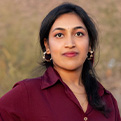
Akshatha Vydula
-
Profile
Akshatha Vydula is a Postdoctoral Research Associate in the Department of Physics. Her research focuses on the early Universe, particularly the formation of the first stars and galaxies. More generally, she is interested in developing tools for calibration and analysis of data from low-frequency radio telescopes. She is a member of the EDGES collaboration, the only experiment to have reported a detection of the redshifted 21cm signal from cosmic dawn. She leads the blind analysis for the next-generation EDGES experiment, developing and validating edges-analysis, an open-source framework to unify datasets from global 21cm experiments. Her work spans multiple fronts, including the first spectral modeling of low-frequency galactic radio recombination lines, as well as space-based measurements of the neutron lifetime using archival Lunar Prospector data. Beyond cosmology, she has collaborated with scientists at the VLA and LWA to advance antenna beam characterization methods for low-frequency radio telescopes. At U of R, she is working with Prof. Jack Singal to produce an absolutely calibrated sky map at 310 MHz using the Green Bank Telescope, the largest steerable radio dish, located in West Virginia.
Passionate about science equity and communication, she is committed to expanding access to astronomy for underserved communities. She founded an astrophysics club at RV College of Engineering in India, where she continues to advise students on research and outreach. At ASU, she organized journal clubs, engineering-focused coffee talks, community open houses, and mentoring through the Sundial program, and also delivered numerous public talks across India and the United States. For her contributions to astrophysics and science communication, she was recently honored with the Bharat Gaurav Puraskar and recognized as one of the 35 Under 35 Non-Resident Indians by the Bharat Vikas Foundation.
Expand All-
Grants and Fellowships
Graduate Student Government travel award, 2024-2025 academic year
ComSciCon 2024 Fellow, offered to 50 out of 800-1200 applicants each year (travel award to attend the Annual Flagship workshop in Boston, MA)
National Academies 2025 Travel Fellowship Award to attend the NRSM-URSI Meeting in Boulder, CO
-
Awards
2025 Bharat Gaurav Puraskar (35 under 35 NRI Achievers), presented by Department of Education, Govt. of India.
2025 ASU Graduate Academic Excellence Award
-
Presentations
INVITED TALKS
Experimental Frontiers in 21cm Cosmology and Radio Synchrotron Background Studies
New Avenues in Particle Cosmology, Winchester, UK (May 20, 2025)Radio Astronomy techniques to measure the Global 21cm signal from the early Universe
Karnataka Physics Teachers Association (Nov 24, 2024)Space Archaeology: Studying the early Universe using remote radio telescopes
San Jose Astronomy Association (Oct 19, 2024)A Day in a Life of a Radio Astronomer
RV College of Engineering (Oct 15, 2024)Studying Cosmic Dawn using remote Radio Telescopes
Gulbarga Science Center, India (Oct 8, 2024)Low Frequency Radio Recombination Lines with EDGES
LuSEE-Night Seminar, Brookhaven National Laboratory, Long Island, NY (Nov 9, 2023)Space Archaeology: Using 21cm signal to study the early Universe
Annular Solar Eclipse 2023 County Science Outreach, Kanab, Utah (Oct 14, 2023)Using MCNP to measure the Neutron Lifetime in Planetary Environment
MCNP User Symposium, Los Alamos National Laboratory (Oct 20, 2022)Studying Early Universe as an Engineer turned Radio Astronomer
Cosmic Chronicles Talk Series, RV College of Engineering, India (Sep 6, 2022)Studying Early Universe using Low Frequency Radio Telescopes
Grad-to-Grad Colloquium, Dept. of Physics, ASU (Apr 29, 2022)Transition from Engineering to Astrophysics
National Space Society-USA, Mumbai (Jan 24, 2022)TALKS
Validation of EDGES software suite using 10 days of EDGES-3 data
National Radio Science Meeting, Boulder, CO (Jan 2025)Progress on EDGES-3 Data Analysis
7th Global 21cm Workshop, Raman Research Institute, Bengaluru (Oct 2024)Low Frequency Science: Radio Recombination Lines and Beam Holography
Caltech Lunch Seminar (Jul 9, 2024)Beam Mapping of VLA 4-band using Dish Holography
SESE Annual Symposium (Aug 2023)Beam Mapping of LWA using Pulsar Holography
38th Annual New Mexico Symposium (Feb 2023)Low-Frequency Radio Recombination Lines Away From the Inner Galactic Plane
241st AAS Winter Meeting, Seattle, WA (Jan 2023)Low-Frequency Radio Recombination Lines using EDGES
5th Global 21cm Workshop, UC Berkeley (Oct 2022)Effects of Surface Temperature and Compositions on the Measurement of Neutron Lifetime
Space Science and Applications (ISR-1) Seminar, LANL (Jul 19, 2022)Measurement of Neutron Lifetime using Space-Based Neutron Spectrometer
LANL Summer Symposium (Aug 3–4, 2021)Measurement of Neutron Lifetime using Space-Based Neutron Spectrometer
SESE Annual Symposium (Aug 18, 2021)
-
Grants and Fellowships
-
Publications
Journal Articles
Vydula, A.K., Bowman, J.D., Lewis, D., Crawford, K., Kolopanis, M., Rogers, A.E., Murray, S.G., Mahesh, N., Monsalve, R.A., Sims, P. and Samson, T., 2023. Low-frequency Radio Recombination Lines Away from the Inner Galactic Plane.The Astronomical Journal, 167(1), p.2 https://doi.org/10.3847/1538-3881/ad08ba
Vydula, A.K., Coupland, D., Mesick, K. and Hardgrove, C., 2025. Systematic uncertainties in the measurement of the neutron lifetime using the Lunar Prospector neutron spectrometer.Physical Review C, 112(1), p.015807. https://doi.org/10.1103/q8jf-dc9b
Sims, P. H., Bowman, J. D., Mahesh, N., Murray, S. G., Barrett, J. P., Cappallo, R., Vydula, A. K. (2022). A Bayesian approach to modelling spectrometer data chromaticity corrected using beam factors–I. Mathematical formalism. https://doi.org/10.1093/mnras/stad610
Murray, S.G., Bowman, J.D., Sims, P.H., Mahesh, N., Rogers, A.E., Monsalve, R.A., Samson, T. and Vydula, A.K., A Bayesian Calibration Framework for EDGES. https://doi.org/10.1093/mnras/stac2600
Sims, P. H., Bowman, J. D., Mahesh, N., Murray, S. G., Barrett, J. P., Cappallo, R., Vydula, A. K. A general Bayesian model-validation framework based on null-test evidence ratios, with an example application to global 21-cm cosmology (2025) https://doi.org/10.1093/mnras/staf1109
Cappallo, R.C., Rogers, A.E., Lonsdale, C.J., Bowman, J.D., Barrett, J.P., Murray, S.G., Mahesh, N., Sims, P., Vydula, A.K., Monsalve, R.A. and Eckert, C.J., 2025. EDGES-3: Instrument Design and Commissioning. arXiv preprint https://arxiv.org/abs/2508.02577
Kosogorov, N., OVRO-LWA Collaboration, (including Vydula, A.K.), Implementing Continuous All-Sky Monitoring with the OVRO-LWA to Identify Prompt and Precursor Counterparts of Gravitational Wave Events (2025) https://doi.org/10.3847/1538-4357/add014
Zhang, P., OVRO-LWA Collaboration, (including Vydula, A.K.), Probing the Turbulent Corona and Heliosphere Using Radio Spectral Imaging Observation during the Solar Conjunction of Crab Nebula (2025) arXiv:2506.01632
-
In the News
Spacecast 101
Thu., Aug. 28, 2025AAS Journal Author Series
Sun., Feb. 18, 2024Forest Voices of India
Tue., Oct. 3, 2023Engineer turned Astrophysicst - Peregrination
Sun., Jan. 30, 2022 - Links